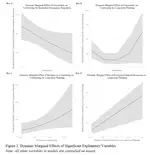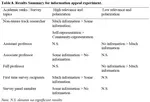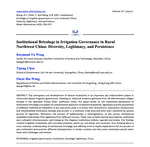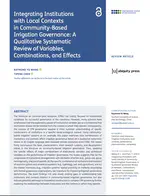Welcome
I am a Ph.D. candidate in Public Administration and Policy at the School of Public Affairs, Arizona State University, and a Graduate Research Assistant in the Center for Science, Technology and Environmental Policy Studies (CSTEPS).
My research focuses on public management, public personnel management, public participation, local government, and climate adaptation. My dissertation examines how public participation and community outreach shape public employees’ psychological states and workplace behaviors. In addition, my ongoing projects explore how public organizations respond to external uncertainties, such as extreme weather events and emerging technologies, to ensure organizational resilience and sustain public service delivery. I am also interested in survey and experimental methods. My work has been published in interdisciplinary outlets, such as PlOS ONE, International Journal of the Commons, Water Alternatives, Vaccines, and Women’s Health Reports.
Prior to joining ASU, I received my master’s degree and bachelor’s degree from Sun Yat-sen University in 2022 and 2019. My previous research centered on common-pool resources governance and institutional analysis, with a specific focus on water resources.
Please feel free to reach me at tpchen [at] asu [dot] edu.
- Public Management
- Public Personnel Management
- Public Participation
- Organizational Theory and Behavior
Education
Ph.D. in Public Administration and Policy, May 2026 (expected)
School of Public Affairs, Arizona State University, USA
M.Sci. in Public Administration, 2022
School of Government, Sun Yat-sen University, China
B.Mgmt. in Public Administration, 2019
School of Government, Sun Yat-sen University, China
Working Papers
Publications
Teaching
PAF 460: Public Service Ethics (Spring 2026)
Overview
Ethical dilemmas are a recurring challenge across various sectors, including business, education, technology, and public service. From questions about data privacy and artificial intelligence to public scandals involving misuse of power, ethics remain a central concern in public life. Public organizations, in particular, are under constant scrutiny as the actions of public officials carry significant moral and societal implications.
As a public manager, you will face difficult ethical choices that may relate to your relationship with a democratically elected legislative body, your relationship to citizens and community groups, matters of conscience, matters of regulation, and the ethical ramifications of public policy recommendations in which you are involved. Understanding the moral implications of your actions and resolving the dilemmas they pose are among the most difficult problems you will face in the public sector.
In this class, we will examine a variety of ethical issues faced by public managers. Some involve concerns that might arise in any organization—cases of lying, cheating, or stealing, or questions about what to do when you feel compelled to refuse an order from your boss. Others are more directly connected to the special values that underlie public service, involving the relationship between political leaders and career civil servants or between competing demands for efficiency and responsiveness. In all cases, the issues will be bound to the moral context of public service.
Course Objectives
- Enhance understanding of the moral foundations of public service
- Examine the relationship between democratic values and the practice of public administration, including issues of accountability and responsiveness
- Develop an awareness of specific ethical issues and problems within the field of public administration
- Build the capacity for ethical decision-making
- Understand the values at play in the relationship between administrators and citizens
- Develop a practical understanding of the constraints on and expectations of public administrators
- Develop skills in managing ethics within public organizations
- Learn to apply ethical reasoning to the consideration of public policy issues
Public Personnel Management
Overview
This course examines public sector human resources management policies and systems. Students will learn about the role and dynamics of public human resources systems, and how systems, policies, and rules reflect and support the public values in a democratic system, including managerial efficiency and effectiveness, as well as the democratic values of equity, representation, and accountability. This course also covers key topics of organizational theory and behavior in the public sector, including public service motivation, group behavior, leadership, and performance. Upon completion, this course will provide a foundation that will benefit students in both their studies of public administration and their professional careers.
Course Objectives
- Describe the role of human resource management in the public sector
- Understand the goals and tools of goal setting, public personnel appraisals, and performance management
- Understand the recruitment and retention challenges, as well as compensation and benefit options in the public sector
- Demonstrate the capacity to effectively address managerial issues, including: a) Employee need and motivation; b) Employee morale, attitudes, and behaviors; c) Communication; and d) Diversity and inclusion
- Know and apply the prominent theories of leadership to employee situations
- Effectively communicate strategies and responses to organizational challenges
Applied Statistics for Public Service
Overview
Statistics is the study of how best to collect, analyze, and draw conclusions from data to solve a problem. Policymakers use evidence from big data and statistics to assist their decision-making for social problems. Scientists seek to understand the world by carefully collecting data and using rigorous statistical analysis. This course is designed to provide students with the skills and knowledge necessary to collect, understand, analyze, interpret, and criticize datasets for the purpose of studying and understanding public service. At the end of this course, students will learn basic concepts of statistics, data, and statistical inference. Students will also have the skills to conduct basic analyses of data in R software. Throughout the course, students will be expected to connect the statistical skills they learn with their own interests in public service problems.
Course Objectives
- Understand and use elementary statistics (descriptive statistics, statistical inference, etc.) to explore, describe, and analyze problems in public service settings
- Understand basic concepts of statistics, including confidence interval, probability, sampling, and regression
- Locate, download, import, and analyze secondary data for public service
- Use statistical software, such as R, to clean and analyze quantitative data
- Understand how research, data collection, variable construction, and analysis are socially constructed activities with limitations
- Communicate about statistical results for a lay audience
Teaching Assistant
PAF 560: Community Resilience (Summer 2024)
- Evaluated student assignments
- Responded to student questions and provided academic support
- Curated and shared weekly policy-relevant news updates
PAF 160: Surviving the 21st Century (Summer 2025)
- Evaluated student assignments
- Responded to student inquiries and facilitated discussions
- Managed and moderated the online discussion board




